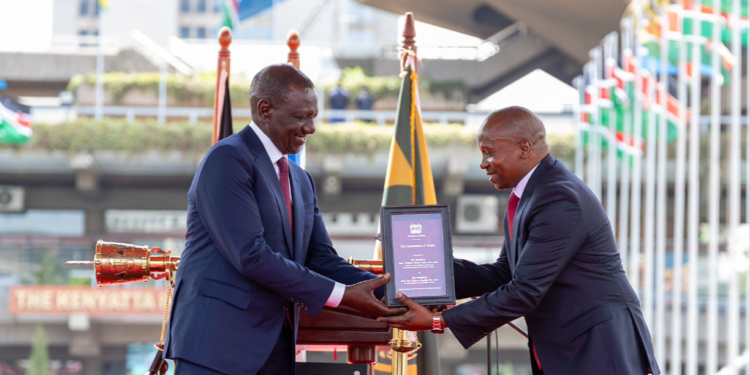Kenya’s President William Ruto has acknowledged being a “lonely voice” in the executive branch over the past two years, as he swore in Abraham Kithure Kindiki as his new deputy president, calling on him to help articulate the government’s transformation agenda.
In an admission during the swearing-in ceremony in Nairobi, Ruto said: “I have almost become a lonely voice in the executive, especially in the presidency, speaking about our projects, speaking about our programs, elaborating on what we are doing.”
The president’s remarks came as he outlined his expectations for Prof Kindiki, whom he praised as “eloquent” and “intelligent,” expressing confidence that his new deputy would fill the communication void that has existed in his administration. “I need your voice, I need your intellect to help me and to help members of our cabinet to profile the things we are doing,” Ruto said.
The appointment follows the impeachment of former Deputy President Rigathi Gachagua, marking Kindiki as the third deputy president under Kenya’s 2010 constitution. Kindiki, a former cabinet secretary and Senate majority leader, brings extensive experience in public service and academia to the role.
During the ceremony, Ruto highlighted several key government initiatives requiring immediate attention. These include a new education funding model, the distribution of fertilizer to farmers nationwide, and an ambitious housing program that aims to provide affordable housing to ordinary Kenyans for monthly payments of as low as KES 3,000.
The president also addressed mounting security concerns, particularly regarding recent violence against women. “The DCI [Directorate of Criminal Investigations] and all the investigative authorities in the Republic of Kenya must stand up to these criminals and we must deal decisively and firmly,” he declared.
Focusing on economic transformation, Ruto detailed progress in various state corporations, noting that Kenya Power has become profitable under his administration’s stewardship. He also outlined plans to connect 300,000 homes to electricity through a rural electrification program and announced that 160,000 people are currently employed in the government’s housing program.
The president emphasized his commitment to youth employment, revealing that 10,000 young people are engaged in Climate WorX in Nairobi, with plans to expand this to 40,000-50,000 in the coming months. He also announced ambitious environmental initiatives, including the cleaning and transformation of the Nairobi River.
Addressing corruption, Ruto called for stronger collaboration between investigative institutions and the judiciary. “I call upon the office of the director of public prosecution, the offices of the DCI, and the offices of the IG to work with the judiciary so that the corrupt can be firmly decisively dealt with,” he stated.
Prof Kindiki, in taking his oath of office, committed to serving “without fear, without favor, without affection, and without ill will,” a pledge that Ruto specifically highlighted in his speech. The president emphasized that public servants must serve “without bias” and remember that Kenya is “one nation, one country, one people.”
The ceremony also saw Ruto outline progress in implementing his administration’s manifesto, which he described as “elaborate” and “transformative.” “We are implementing it page by page, paragraph by paragraph, chapter by chapter,” he said, “because we have to transform this great nation and failure is not an option.”
















